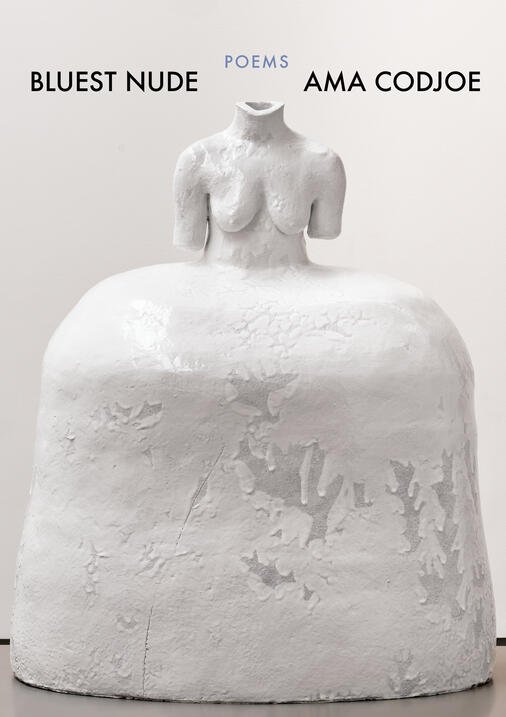Bluest Nude
Ama Codjoe
Reviewed by Sylvia Foster
Ama Codjoe’s debut collection Bluest Nude brims with paintings, photographs, and sculptures, which serve as more than source material for ekphrastic poetry; Codjoe brandishes art, particularly art created by Black women, as a medium with which to materialize her poetic project. Codjoe interacts with these artists and their work such that the poem that follows becomes an extension of the visual piece that precedes it, as if the poetry of now is grasping hands with the visual art of the past.
One example of this timeless connection comes from “Detail from ‘Poem after Betye Saar’s The Liberation of Aunt Jemima,’” which meditates on Betye Saar’s 1972 piece. Time and image seem to collapse as the speaker “[beholds] a sea / of blood, dark as syrup, oozing / from Aunt Jemima’s neck, / and four women flying, without shoes / or wings, from her maternal, amber body,” making it clear that the liberation of Aunt Jemima is still ongoing.
Juxtaposed with myriad artistic and cultural references are exquisite vignettes of personal experience. Various intimacies are entangled in the soft and moody language of this collection, which nurses a quiet eroticism throughout. Codjoe explores all the possibilities of womanhood and sex, from being perceived in the “fractured angles of sex” to the speaker’s lament, “Oh, to be a stone, sexless and impenetrable.”
The simultaneous desire for sex and sexlessness is echoed in the coexistence of motherhood and non-motherhood. Codjoe asks, Is it labor that makes a mother? If so, which kind(s)? The ambiguity of mothering leads to one of the most electric moments in the collection: “I hid / my tears from my mother because that’s what mothers do.” Here and throughout Codjoe’s work, womanhood undulates and continually unfurls.

